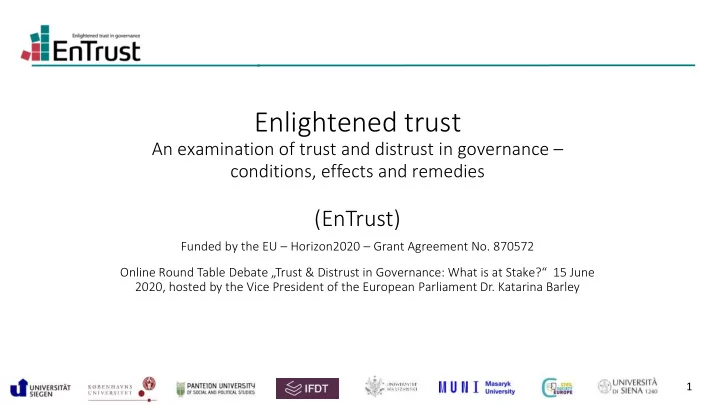

Enlightened trust An examination of trust and distrust in governance – conditions, effects and remedies (EnTrust) Funded by the EU – Horizon2020 – Grant Agreement No. 870572 Online Round Table Debate „ Trust & Distrust in Governance: What is at Stake?“ 15 June 2020 , hosted by the Vice President of the European Parliament D r. Katarina Barley 1
Trust in in governance (the Horizon2020 call) a critical societal challenge: erosion of trust in a context of multiple crises • growing dissatisfaction, political unrest and polarization • increasing uncertainty, disinformation and mistrust in the public sphere affecting: national and European governance, markets, expertise and science, mass media 2
The focus: trust and distrust! Th democratic system trust distrust political institutions citizens political organizations political personnel 3 3
The focus: trust and distrust! Th `spill-overs ‘ financial / trust economic distrust democratic system sector political institutions citizens political organizations political personnel science / experts `spill-overs ‘ 4 4
Le Less ssons to to be be drawn identify the right balance: enlightened trust, understand disruptive imbalances 5
Th The focus: dis/trust as reciprocal relation! democratic system trusting / distrusting political institutions citizens political organizations being trusted / distrusted political personnel 6 6
Le Lessons to to be be drawn identify the right balance: enlightened trust, understand disruptive imbalances understand that mutual investments are needed: promote ‚ cultures ‘ of enlightened trust 7
The focus: Th Credibility, Sincerity (what they say they’ll do, intentions) trustworthiness! instrumental assessment Impartiality Reliability (what they do and how, normative (what the compass of agency) judgement their actions is, frames) Accountability (how they deal with what they did, consequences) 8
Le Lessons to to be be drawn identify the right balance: enlightened trust, understand disruptive imbalances understand that mutual investments are needed: promote ‚ cultures ‘ of enlightened trust develop an understanding of country specific solutions 9
Understanding tr trust / / dis istrust: the tasks mapping and comparing levels and forms of trust and distrust in countries analysing dis/trust formation in different arenas: street level encounters, political contentions, public discourses identifying causes, correlates and consequences portraying scenarios, critical junctures proposing models of enlightened trust 10
Aims • Develop a theoretical framework and systematic data Evidence • Analyse dis/trust formation in different arenas: street level, organisational fields, public spheres (mapping, • Compare seven countries (Czech Republic, Denmark, Germany, Greece, Italy, explaining) Poland and Serbia) • Identify good practices, develop role models and policy recommendations Agency • Engage in dissemination, communication and exploitation (impact/ • Target-specific dialogue: policy and stakeholders, civil society, scientific dissemination) community and general public 11
Th The work-plan: work-packages analytic empirical prescriptive 12
The people University of Siegen (USIEGEN) – Coordination Copenhagen University (UCPH) Panteion University Athens (PANTEION) Institute of Philosophy and Social Theory, University Belgrade (IFDT) University of Warsaw (UNIWARSAW) Masaryk University (MU) Civil Society Europe (CSE) University of Siena (UNISI) 13
https://entrust-project.eu Christian Lahusen University of Siegen Department of Social Sciences Adolf-Reichwein-Str. 2 57068 Siegen – Germany tel: +49 (0) 271-740 3296 fax: +49 (0) 271-740 4501 email: entrust@uni-siegen.de 14
Recommend
More recommend